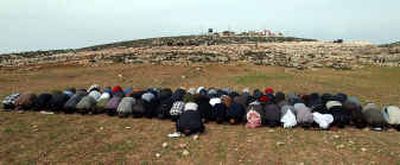New hope for peace in Mideast

GAZA CITY, Gaza Strip – A rare optimism is taking hold among Palestinians amid signs of a possible breakthrough in the long-deadlocked Mideast peace process.
Palestinians are looking to next month’s election to replace Yasser Arafat as a new opportunity for peace and perhaps the first real democracy in the Arab world – and their support for violent militants appears to be waning, polls say.
“We want to live freely, to live like other human beings, to feel peace and security, not to worry about the future of my sons,” said Hisham Karm, 33, speaking on a Gaza street.
The new hopes for peace – stronger than at any time since the outbreak of the Palestinian uprising four years ago – are shared by Israel and much of the international community.
In recent days, Egypt’s president praised Ariel Sharon, Israel offered the Palestinians “quiet for quiet” and even Syria said it’s ready to talk.
Still, the intefadeh, or uprising, isn’t over, peace talks are a ways off and life for most Palestinians is as hard as ever. Both Israeli Prime Minister Sharon and Egyptian President Hosni Mubarak have taken to dousing the euphoria, explaining that no magical peace leap is at hand.
Yet the optimism itself is changing the region’s political dynamics, bolstering moderate voices among the Palestinians, and making it easier for Sharon to push through his plan to withdraw from the Gaza Strip and four West Bank settlements next year.
Sharon on Friday invited the dovish Labor Party to join his flagging coalition a day after a majority of 3,000 leaders of his own Likud Party voted to let it happen. Such a victory would have likely eluded Sharon only weeks ago, when gloom reigned supreme in the Middle East and hard-liners often held sway.
Two polls this month showed a drop in support for the militant Hamas group and an increase for the mainstream Fatah movement. The independent Jerusalem Media and Communication Center, in a survey of 1,200 people with a 3 percent error margin, found that 52 percent of Palestinians now oppose militant attacks on Israelis, compared with 26.9 percent in June.
Palestinian lawmakers are at work amending electoral laws that would make it easier for militants to participate in politics, hoping that a stake in the system will persuade them to halt attacks.
Diplomats from around the world have descended upon Israel and the Palestinian territories, hoping to build on the peace momentum. The exhilaration hit a fever pitch this month when Mubarak described Sharon as the Palestinians’ best chance for peace, then proceeded to release accused Israeli Arab spy Azzam Azzam, receiving six Egyptian students jailed by Israel in exchange.
Both Israel and the United States had refused to talk to Arafat because of what they said was his support for terrorism. His death on Nov. 11 removed what they called the main obstacle to negotiations.
But few expect serious talks to resume until after Jan. 9 elections to choose Arafat’s successor. Despite favoring his candidacy, Israel has carefully avoided any public embrace of the front-runner, Mahmoud Abbas, for fear of tarnishing his image in the Palestinian street.
Sharon has, however, offered assurances of full freedom of movement to carry out elections, and initiated contacts to coordinate the logistics. And Sharon has promised to refrain from military actions “if there is quiet” — a vow that has been repeatedly tested in recent days.
Overall, violence between the two sides has decreased since Arafat’s death. But Palestinians say Israeli-imposed hardships – especially the ubiquitous roadblocks dotting roads and encircling towns – have not let up.
“He (Sharon) was always telling Arafat that he wanted actions, not words,” said deputy Palestinian Information Minister Ahmed Soboh. “Now we are saying to Sharon we need actions and not words.”